Hello and welcome!
Each year, around this time when people are away, and very few events are scheduled, I like to invite two or three of our newly ordained priests to share their reflections with you. I think it’s a very good way for people to get to know some of our new priests and also an opportunity for them to share their vocation stories and their experiences as they begin their priesthood.
This week, we will hear from Father Gabriel Hanley, parochial vicar at Immaculate Conception Parish in Marlborough. I hope you enjoy reading his story as much as I did!
Until next week,
Cardinal Seán
Thank you, Cardinal Seán, for this opportunity!
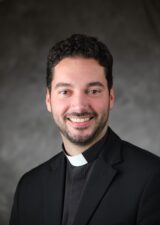
Born and raised in Framingham, Massachusetts, I hail from an all but ordinary family; my father being an Irish Catholic Bostonian and my mother, a Dominican immigrant who came to Boston at the age of 17. It was always my parents’ priority to instill in us, their six children, the Catholic faith as the most important element of our lives. With all of their involvement in our local parish — from the choir to teaching confirmation classes — my mother and father began to see that in spite of their efforts to raise us in the faith, it was not enough to keep us from the allurement of the world.
Being the middle boy, I found myself the black sheep in an extremely religious family. I also felt kind of lost in the mix of four brothers and a sister — and I felt neither entirely American nor entirely Hispanic. I often remember feeling eclipsed by my other siblings. Because I was lacking in a sense of identity, I began to create my own based on my hobbies.
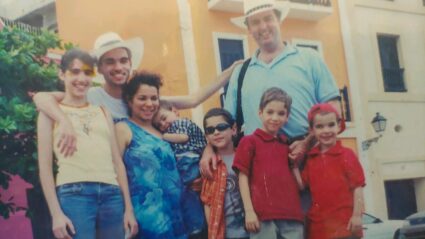
Already in elementary school, I would fill sketchbooks with artwork and endlessly compete with my brothers in basketball. In middle school, I began to skateboard for hours on end, and I would carry a deck of cards through the halls of my school, always ready to perform a magic trick to impress my peers.
When I made it to high school, I was diligently playing guitar and singing. Although my hobbies would win me a bit of gratification, I could never hold onto that sense of satisfaction for too long because it would soon be swallowed up by my insecurity. I was continuously brought back to square one, questioning whether I was actually appreciated. At the same time, high school opened up new avenues for me to escape from my sense of inadequacy. Be it parties or spending days with friends, I was always running away from the reality at home and who I really was.
What changed everything was the arrival of a group of missionaries from the Neocatechumenal Way who started a series of talks at my home parish. Although my parents brought me kicking and screaming, what the missionaries were saying intrigued me. They told me that Christianity was ultimately rooted in having an experience with God; it was about receiving the news that God loves me as I am and that the characteristics that I despised in myself were the very place for God to display His grace and reveal His glory. It all sounded so new to me because, up until then, I had thought that Christianity was about piling up as many good deeds as possible to build my way to heaven.
Thankfully, these missionaries told me that none of this was true and, in fact, that through Jesus Christ, I could discover that I have a Father in heaven — that is to say that my identity has nothing to do with what I can do for God. Instead, it is God who has loved me first, and my identity is that I am a child who belongs to Him.
Despite the initial breakthrough, I still wavered between the world and the Church. Nevertheless, God still had His eye on me. I remember that in my junior year of high school, while my heart was straying from God once again, I was at a retreat with my Neocatechumenal community where we watched a video of a recent vocational call where Kiko Arguello, the initiator of The Way (as it is often called), invited all of the young men who felt that the Lord was calling them to give their lives for His priesthood to receive a blessing. I began to feel very anxious and unsettled, and the thought kept turning over in my head, “Why does it feel like he is talking to me personally?” I told no one about the experience, and I wrestled with that initial call for about two years. By the end of high school, I decided not to go immediately to college and instead took a year off, during which I worked for a stationary company named Felix Doolittle, where I was mentored by an artist, Felix Fu, in preparation to go to art school. After that year, I attended Montserrat College of Art for one semester. While I was pursuing everything I had planned for my future, the inner struggle continued.
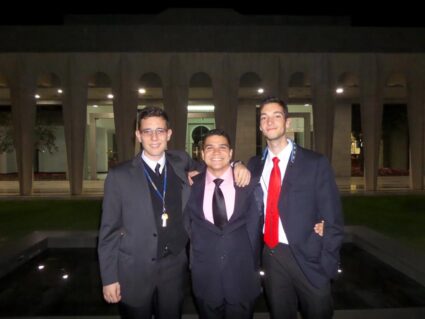
Providentially, an opportunity opened up for me to travel to the Holy Land. So, in January 2015, I left everything in order to face God in Israel. I spent seven months there, residing and serving at the Domus Galilaeae, a house for pilgrims visiting the Holy Land. There, we lived a nearly monastic life immersed in work and prayer. I spent mornings washing windows, cleaning bathrooms, preparing guestrooms, and evenings serving those pilgrims in the restaurant of the house. It was during those seven months that I discovered that in serving the Lord, I was much happier than doing my own will, and it was throughout that time that the Lord slowly broke me down to finally accept his calling to the seminary. And so, during a pilgrimage to Jordan (at the birthplace of Elijah in Tishbe), I finally decided to pursue the priesthood.
Shortly afterward, I was sent to Porto San Giorgio in Italy for the retreat at which all of the aspiring seminarians of the Redemptoris Mater offer themselves to be sent to any seminary in the world. Although I wished to go somewhere far away and exotic, I ended up being assigned to the seminary of Boston, which was not in my plans. I could not see it then, but what I would soon discover is that God does not make mistakes and that there was no more perfect place that I could be assigned.
During my years in the seminary, I began to grow more and more fond of my hometown. The more I was exposed to the reality of the Church in Boston, the more clearly I could see how my upbringing was geared toward its mission. I discovered that having a Dominican mother and an Irish-American father has given me the opportunity to relate to the cultures that make up much of the faithful of the area.
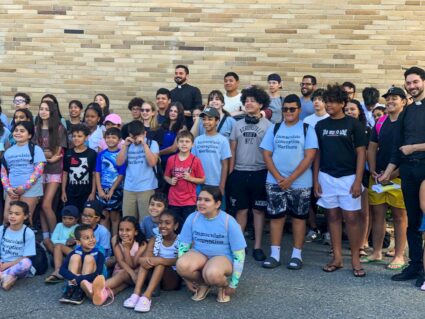
This has been especially evident to me with my assignment here at Immaculate Conception in Marlborough, first as a deacon and now as a priest. I see God even used my upbringing in Framingham among the large Brazilian community to give me that initial desire and push to start learning Portuguese to also serve the Brazilian community here at our parish. Also, it is clear to me that my vocation is not just for myself but also a sign for those in my family who are far away from the Church. Those who have no relationship with God are now able to see God present through the fact that He has set me apart for His ministry.
This has opened my eyes to see that my vocation is not only a means by which God infuses my life with meaning but also the way in which He has sought to heal me. I think to myself now how great a blessing it has been to be sent to Boston because, perhaps, if I had been sent somewhere else, I would have tried to cut ties with my identity and create a new one by taking up some other culture, without ever accepting who I am and where I came from. Through this calling, God is teaching me to embrace my roots and to be no one other than myself so that by discovering His unique love for me as I am, I can also bring His love to those He has entrusted to me.
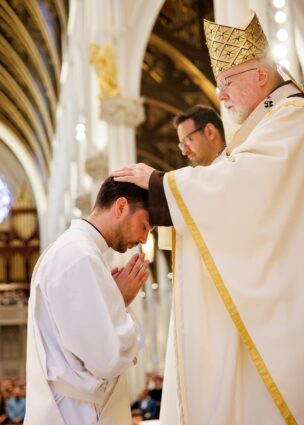
One thing that was most striking to me about the ordination was the joy of those who attended. It often seemed that those around me were even happier for me than I was. It dawned on me that their joy was coming from somewhere deeper. I understood that the joy of everyone who attended sprouted from the fact that the ordination of 11 men was a living testimony to God’s continued fidelity and his promise to forgive sins and to give new life to humanity through the Eucharist.
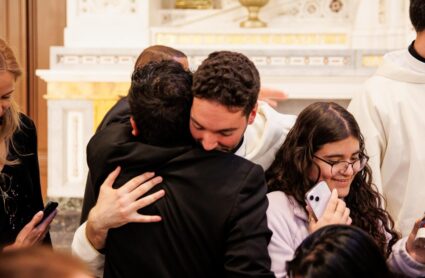
I would like to share one moving event that took place shortly after being ordained. It was when we went to celebrate Mass with the priests of Regina Cleri. At the moment of the consecration, when we said all together, “Take this, all of you, and eat of it, for this is my body which will be given up for you,” I was unexpectedly overwhelmed with emotion, but after some reflection it all made sense.
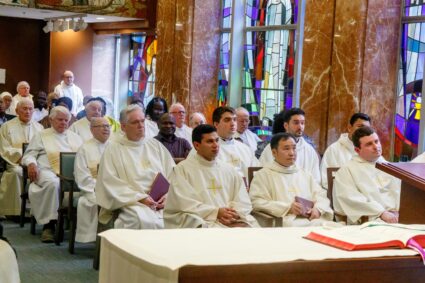
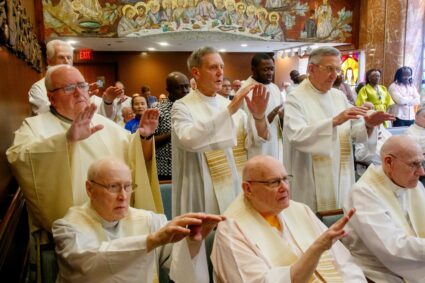
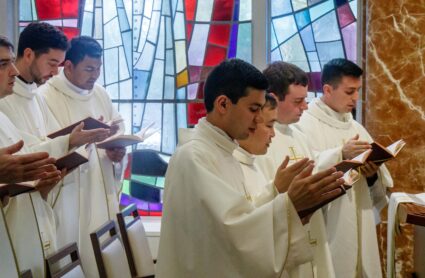
I recalled the years of resistance while at the seminary and how I often distrusted God’s plan for me. But it was through the ordination and in the celebration of the Eucharist that God sealed within me the handing over my own body to His call, and it has been a source of great joy. I see that God is calling me to live a Eucharistic life, where I give of myself so that others may share in God’s divine life, but rather than being depleted from spending myself in ministry, I am instead being filled up.
